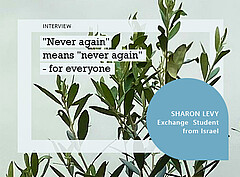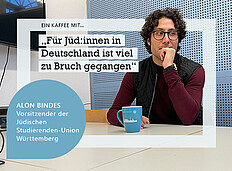Conversation with: Sharon Levy, student from Israel
“Never again” – for everyone [12.12.23]

Olive branches against a cloudy sky. Sharon Levy sent us this view from her garden in Israel as a symbolic image for peace. Photo: Sharon Levy
This interview was conducted in mid-November and is therefore not up to date. Sharon Levy only approved the text after her return to Tel Aviv. This required several translation steps between German and English. For Levy, however, the statements are timeless.
We met Sharon Levy on 13 November, shortly before her departure for Israel. Originally, she wanted to do a Master’s degree in Hohenheim. Now, she says, she wants to get back to her family and think about the next steps. She also wants to get involved in the civil movement. She has already joined an online course at Hebrew University that deals with the sustainable reconstruction of the destroyed kibbutzim in the border region.
She tries to keep in touch with three Palestinian friends in the Gaza Strip via WhatsApp. “They say they have no real trust in the Israeli army and are constantly on the move in search of safety from Israeli bombardment.” She has already lost contact with one of her three friends.
Im Interview: Vorsitzender der Jüdischen Studierenden-Union |

Alon Bindes stammt aus Stuttgart, studiert an der Uni Hohenheim Wiwi im 7. Semester und hat den Bachelor so gut wie abgeschlossen. Seit 3 Jahren ist Bindes Mitglied der Jüdischen Studierenden-Union Württemberg (JSUW), seit 2 Jahren ihr Präsident und Vorsitzender. Im Online-Kurier berichtet er von Angst, Mut, Wut – und was es zur Zeit bedeutet in Deutschland Jude zu sein. |
Interview
Dear Sharon Levy, may we ask how you are doing?
These days I am very sad about the situation, being in my country or abroad.
A lot of hatred, lack of understanding each other, inability of people around me to contain the other side's sorrows. All these make me think that we have not learned from history.
Whoever whishes peace for this land should not pick a side and act like in a football game, waving Israel flags or Palestine flags. It is not a game.
The attacks on the 7th of October were terrible, the suffering and the trauma is ongoing. I am aware of the complexity of our own history. Now, I want people to stop dying, Israelis and Palestinians, and to get all hostages to come back.
You already told us before the interview that there was a turning point in your life that changed your perception of Israel and Palestine. You also told us the vehicle was science and scientific cooperation.
After the army I travelled the world. When I was back, I was thinking of studying environmental studies and I enrolled at the Arava Institut for Environmental studies. The Institute belongs to Ben Gurion University. It is located in the middle of the dessert, a few minutes from the border to Jordan, about one hour from the Red Sea.
The students are about one third Israelis, one third Arabs and one third from Europe and USA. In my class, this included 3 Palestinians from Gaza. The idea of the institution is: nature has no border, so we must work together to address environmental challenges.
90 percent of the curriculum were scientific courses like GIS, water management, environmental education. But we had one meeting per week that was a program for peace building. We would meet for three hours a week to talk about our own histories, traumas and feelings.
These meetings for me were the most meaningful, in order to be able to understand my friends, to see the other side and the different narratives we grow up on.
It was not so easy from the begining to open to each other, there was fear and distrust, which are rooted in us from childhood. It could also be very hard for people to open up, because it can completely crush your narrative that you have heard your whole life and show you that there is something different.
So what was the narrative of your youth?
I had a nice childhood. I grew up in a nice area in the center of Israel. The first opportunity to really meet Palestinians, to hear his stories and life challenges, was when I was 24.
When I turned eighteen and had to do my military service, I was in an educational unit and I was not exposed to the part which confronts with Palestinians. After my military service, I travelled the world, this is a well-known custom. I met people from all over the world. I have not met Palestinians. A lot of the things I heard about Palestinians were negative, through the extremists and the attacks delivered by the news.
When I was young, I felt fear from Arabs and the Arab language. I remember when I was 14 years old, I went on a bus and was scared. I knew that sometimes these people might attack passengers on buses.
I knew we must defend ourselves because we are threatened by all our neighbouring countries and also within the country. And we do not have another place in the world. I didn’t know that by protecting ourselves, others might get hurt.
After my studies I went with friends to a Arab village in Israel to learn Arabic, this made me feel more comfortable. At the same time, I see my old friends still being afraid from Palestinians and from Arabic, today even more than ever.
And the time at the Arava Institute challenged those views?
I learned that there are two sides to this reality.
In High school, we get motivated to go to the army. We go to concentration camps in Poland, we get told, that the holocaust should never happen again, so we must defend ourselves and have a strong army.
During the time at the Arava institute, I heard my Arab friends talking about Palestinian houses being demolished. And I thought to myself: Israeli forces demolishing people’s houses? No way. This kind of oppression happened to us. Why would we do that to others?
I knew we Israelis were hated but I didn’t know why. I knew about the Intifada and the wars but did not know the context of it. In school, we learn about the war we call the Independence War. We do not learn that the Palestinians call it Nakba, which means catastrophe.
Lately, I witnessed how a Palestinian was asked if they learn about the ‘Shoa’ in history classes at school. And he said: no. I realized: we don’t even know each other’s histories.
Beyond the physical separation between Jews and Palestinians there is a cultural separation which causes ignorance, polarization and hatred.
So how did you come to Hohenheim
I came to study a semester at Hohenheim from April to August 2023, as part of a student exchange-program with the Hebrew University in Jerusalem, where I went to study plant science and agriculture after my studies at the Arava-Institute.
And how did the teaching in Hohenheim influence you?
My studies in Hohenheim opened up new perspectives on ecology and I met interesting people from Germany and from other places in the world.
One thing that really influenced me was the module landscape change, resilience, and ecosystem services by Prof. Claudia Bieling. A very poplar word now in Israel is resilience. We need it like a forest after a big burn.
In my project for this course, I had to self-study about a group of indigenous people in Canada (Williams Lake First Nation), the article that I was exposed to explained the history of the land and the history of the indigenous people which were forced and fenced off from the land, by colonizers. This act not just harmed those civilians’ groups but also the land. This article gave me hope, today there is a is cooperation between land managers and the native people on equal footing.
This study connected me directly with the current situation in Israel, walls of separation between people and their original homes and lands.
You told us before, you are just about to use some of the knowledge gained in Hohenheim.
I have signed in for landscape architecture in Jerusalem. We had a zoom meeting yesterday and just started to think about how to do restoration of the Kibbutzim that were burned down by the Hammas on October 7th. I had the idea: doing short interviews with inhabitants who survived, about the way they wish for it to be restored. That is a method I learned from Claudia.
A few weeks ago, you were planning to do your Master in Hohenheim, too.
I did five courses of Master here already and I am currently enrolled at the Hebrew University.
The future will depend on my feelings and sentiments on the location where I want to be. Right now, I want to be home, close to my family and friends – yes, all my friends – on both sides of this sad conflict. Maybe, as things get clearer and hopefully brighter – I will return to Hohenheim in search of further studies.
Let us jump back to politics for one last time. After October 7th, the university of Hohenheim published a note condemning the terroristic attacks against Israel and expressing concern, especially for their partners like the Herbrew University…
…may I just read it?
(after having read)
These attacks were horrible and evil and of course they should be condemned. Some of the acts of the Israeli army in Gaza and the west bank, should be stopped and criticized in my opinion.
There are a lot of Arabs here in Hohenheim. People here might have a friend (like I do) or family in Gaza. There is a sentence I grew up on (based on the Shoa): “Never again“ – and that means never again for everyone. Not only jews.
Right now, we have violence bringing more violence and more generations with trauma. I feel every day brings more hate and destroys our chance of having a decent future and peaceful lives here on this land.
I believe the only real solution is to build a reality were everybody has equal rights and is treated equally by the regimes. Whether it is one state or two, the future must be one that allows everyone to move freely on the land and live safely and with dignity.
Interview: Dorthea Elsner & Florian Klebs
Diversity-Audit |
Ob Geschlecht oder Alter, ethnische Herkunft, Religion oder sexuelle Orientierung: Das Audit „vielfaltsgerechte hochschule“ zertifizierte 2023 die Uni Hohenheim als eine der ersten beiden Unis für ihr Engagement in Sachen Diversity. Durchgeführt wurde es von der berufundfamilie Service GmbH. Mit dem Audit verbunden ist ein Handlungsprogramm, mit dem das Diversity-Management weiterentwickelt wird. |